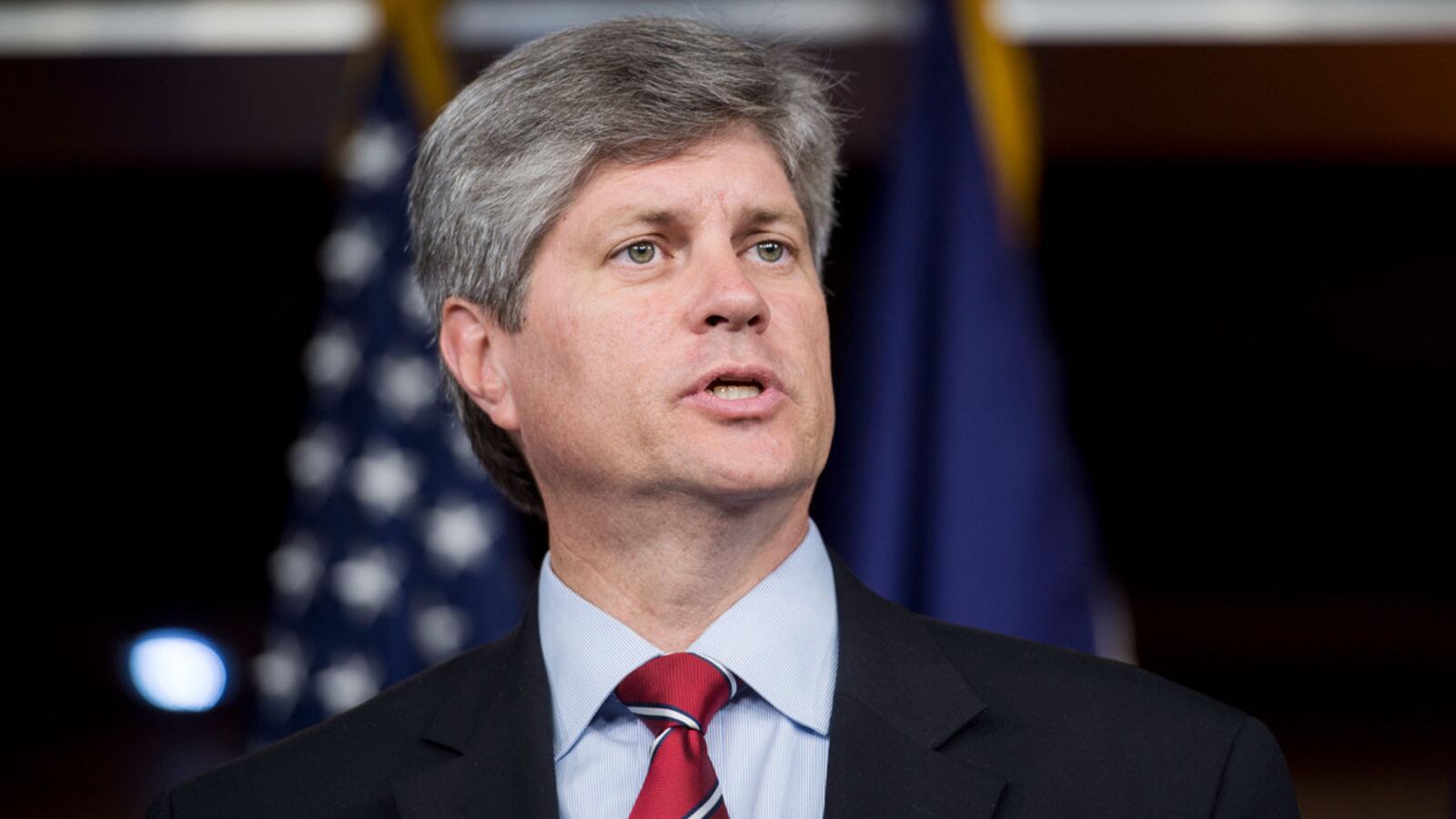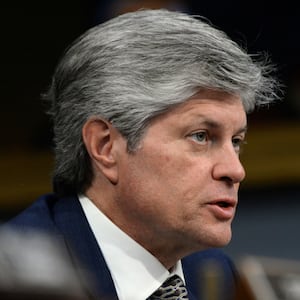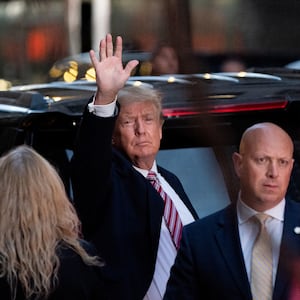After Rep. Jeff Fortenberry (R-NE) was indicted last week for lying to the FBI over foreign donations to his campaign, authorities took the curious step Thursday of trying to prevent the nine-term Republican from tampering with witnesses or handling evidence without supervision—up to barring him from being alone in the room with evidence.
The request, filed on Thurday by federal prosecutors in the U.S. District Court for the Central District of California and granted the next day by Judge Stanley Blumenfield, also reveals that the government is pursuing multiple related investigations involving other “public officials.”
In issuing the order, Blumenfield sided with the prosecution’s concerns that Fortenberry cannot be trusted to handle evidence about cooperating witnesses. The ruling prohibits Fortenberry from taking notes or “memorializing” the evidence, and would even require his lawyers to ensure he is “never left alone with any Cooperator Materials.”
“Defendant may not take any Cooperator Materials out of the room in which defendant is meeting with the Defense Team. At no time, under no circumstance, will any Cooperator Materials be left in the possession, custody, or control of defendant, regardless of defendant’s custody status,” the judge wrote.
“Because these materials could be used to identify the confidential informants or cooperating witnesses,” the judge wrote, “the Court finds that the unauthorized dissemination or distribution of the materials may compromise the ability of such persons to participate effectively in future investigations in an undercover capacity and/or may expose him/her to potential safety risks.”
Witnesses against Fortenberry include an unidentified informant, as well as several current and former aides—including his longtime chief of staff Dr. Reyn Archer—whose names were listed at the Nebraska Republican’s arraignment last week. The protective order indicates some witnesses have even been cooperating undercover.
Blumenfield also cited the government’s concerns that, left unchecked, the congressman may disclose information about parallel investigations involving other officials.
“A protective order for the discovery is also necessary so that the government can produce to the defense materials related to sensitive and ongoing investigations, including those related to public officials,” the judge wrote, adding that “disclosure of this information without limitation risks the privacy and security of the information’s legitimate owners.”
Normal due process rights require prosecutors to share their evidence with the defense ahead of a trial. In Fortenberry’s case, however, prosecutors argued that they could not redact sensitive information without rendering the evidence unintelligible. If that information got out, they said, it may compromise witness cooperation and create “potential safety risks,” so it would be necessary to restrict Fortenberry in order for the trial to proceed fairly.
Fortenberry was indicted on Oct. 19 for lying to the FBI about his knowledge of a foreign straw donor scheme run by Lebanese-Nigerian billionaire Gilbert Chagoury. The congressman preempted the news in a video posted that morning on his YouTube channel.
“About five-and-a-half years ago, a person from overseas illegally moved money to my campaign—I didn’t know anything about this—and used some other Americans to do so. They were all caught and punished, thankfully, ” Fortenberry explained in the video. After a 2019 interview with the FBI, he said, “they’ve accused me of lying to them and are charging me with this.”
“We’re shocked. We’re stunned,” Fortenberry added, saying he felt “personally betrayed” by the agents.
In 2016, Chagoury funneled $30,000 to Fortenberry through American donors at a Los Angeles fundraiser, which Fortenberry acknowledges. But prosecutors claim that when one of the hosts of that event informed Fortenberry two years later about the true source of the money, the congressman did nothing to disclose the donation and then later lied about his knowledge to federal investigators.
“The indictment alleges a scheme in which Fortenberry, after learning this information, ‘knowingly and willfully falsified, concealed, and covered up by trick, scheme, and device material facts’ about the illegal campaign contributions,” DOJ said last week in its press release announcing the charges.
It is illegal for foreign nationals to contribute to U.S. elections, and it is likewise illegal for candidates to knowingly solicit and accept such donations. While the indictment does not claim that Fortenberry knew the original source at the time, it does say that the campaign did not disclose or disgorge Chagrouy’s contributions until after the 2019 interview.
According to prosecutors, the probe covers not just the illicit gifts to Fortenberry, but to “other federal candidates” as well. Investigators have also tried to determine “whether any person sought to impermissibly influence the recipient politician in exchange for the contributions,” court filings say.
The Fortenberry indictment cites an unidentified “Individual H” telling the congressman in a 2018 phone call that the $30,000 “probably did come from Gilbert Chagoury because he was so grateful for your support [for] the cause.”
Following the charges, Fortenberry stepped down from his congressional assignments, including his seat on the House Appropriations Subcommittee on State and Foreign Operations, which he has held since 2015.
Fortenberry denies any wrongdoing.
While the nature of the investigations into other public officials is not clear, Chagoury—an industrialist and philanthropist with close ties to the Clinton family—admitted in a 2019 deferred prosecution agreement that he had passed a total $180,000 to four candidates for office.
Last week, Politico identified three officials who had also received straw donations from Chagoury: former Rep. Lee Terry (R-NE) and Rep. Darrell Issa (R-CA), who each got contributions in 2014, and Sen. Mitt Romney (R-UT), via his failed 2012 presidential campaign.
Chagoury, who has leant significant financial support to American causes—including St. Jude Children’s Hospital, also a philanthropic interest of Eric Trump—was fined $1.8 million for the scheme.
One of Chagoury’s spokespeople, Mark Corallo, served as spokesperson for President Donald Trump’s personal defense team in the Russia investigation. Corallo was also a spokesperson for Joe diGenova and Victoria Toensing, associates of Trump ally Rudy Giuliani during the Ukraine scandal.
Chagoury has been cooperating with the investigation as part of his prosecution agreement.
Neither Fortenberry nor his campaign replied to The Daily Beast’s request for comment. He initially tried to raise money off a false claim that Rep. Trey Gowdy (R-SC) would represent him in the case, but has retained John Littrell.
—Updated at 1:11 p.m., 10/29/2021, to clarify the protective order was filed unsigned
—Updated at 5:15 p.m. to reflect the judge signing the order








